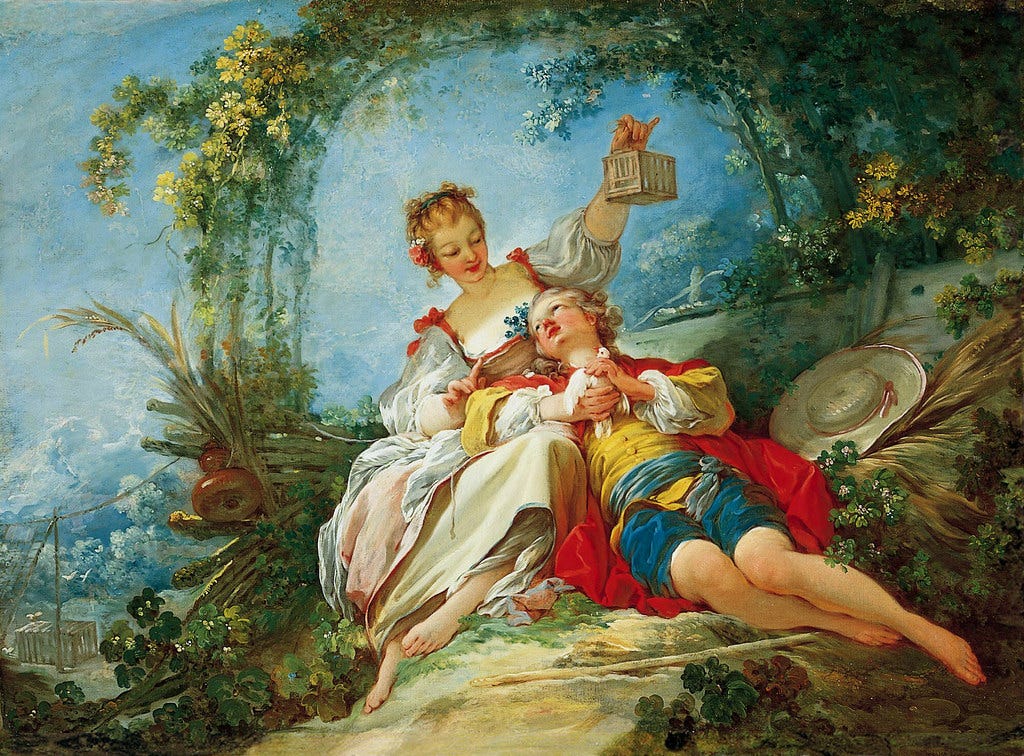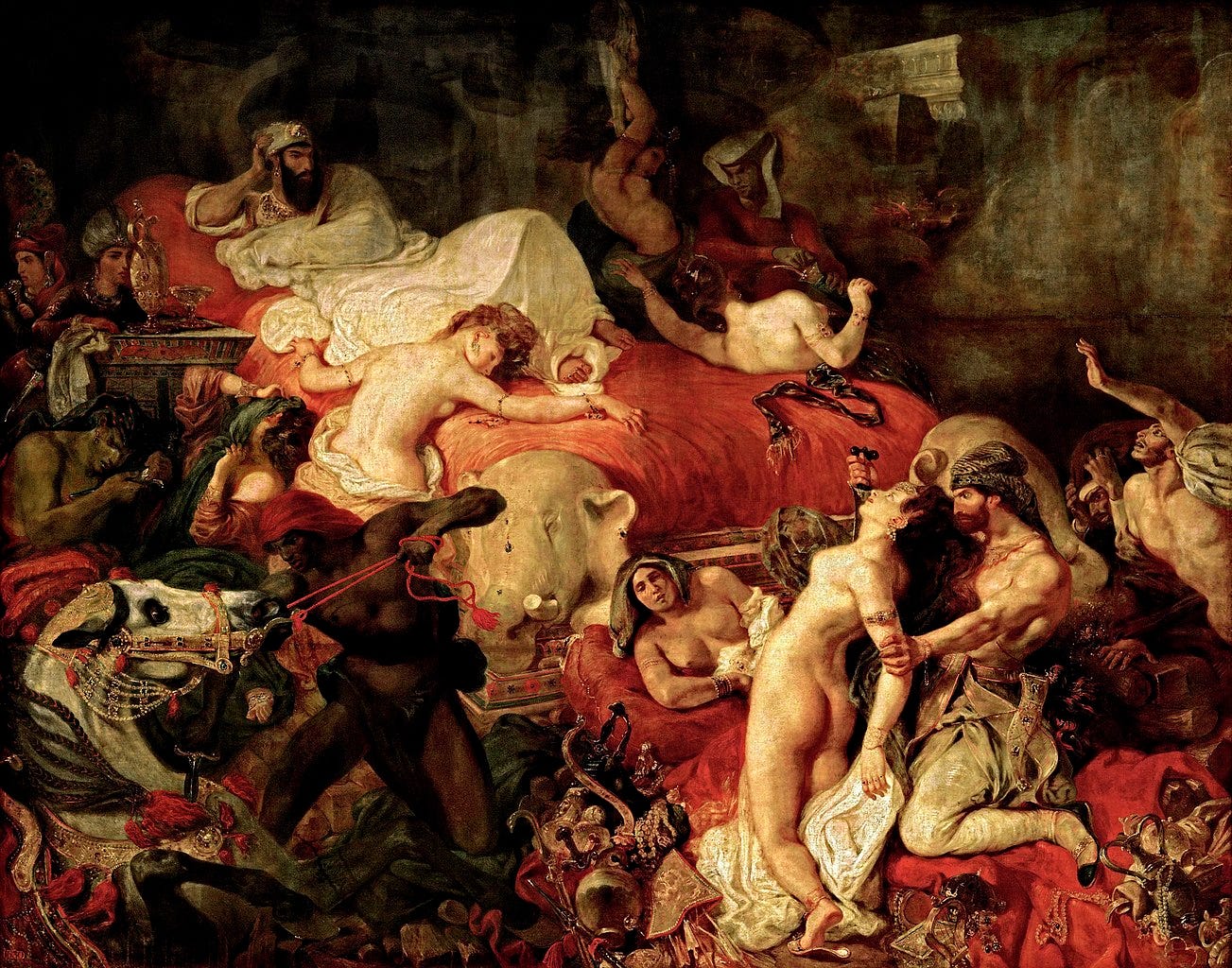A Brief History of Sexual Norms: How the Enlightenment and Romanticism Changed Sexual Mores
The shift from a Theocentric to an Anthropocentric morality
Rationalism and Empiricism changed the way society viewed sexuality
The era of the 16th through 19th centuries was a time of dramatic philosophical shifts in Europe and beyond. This period saw a dramatic shift in the source of authority from that which is handed down to the individual as their own source of authority. Throughout the Middle Ages, the primary sources of authority were the Church, headed by the Pope, and received texts from ancient authorities. The Renaissance widened the knowledge of these ancient authorities, but it also placed more emphasis on the individual and his studies, as exemplified by Leonardo da Vinci.
Then in the 16th Century, Sir Francis Bacon (1561-1626) led the way in developing the scientific method as we know it today. This really started the movement towards empiricism and modern science, and changed the primary source of knowledge from that which was handed down to that which was learned through experimentation and research. This movement has given us many scientific benefits; however, when applied to sex, human sex eventually came to be seen as essentially akin to that of animals, removing the relational aspect of it. This reduced sex to a mechanical means of procreation. One can see how this would later lead to those who have called for developing the technology to reproduce without sex.
Then Rene Descartes (1596-1650) kicked off what is known as Rationalism when he set out to change the source of knowledge to what he considered to be a surer foundation. In the end, he shifted things in two ways. First, he shifted the source of authority from the Church to the individual. Second, he prioritized the mind over the body thereby creating a more dualistic view of the person with the mind having preference.
The Enlightenment sought to challenge religious authority
Ultimately, Rationalism reduced ethics to that which we could deduce logically. This found its pinnacle in Immanuel Kant (1724-1804) who set out to merge Rationalism and Empiricism and ended up being the end of this era and the start of what came to be known as the Enlightenment. Kant developed the categorical imperative which states that we should “Act only according to a maxim by which you can at the same time will that it shall become a universal law.”[1] While Kant was very traditional in his life and ethics, this move opened the way for people to think differently about sexual ethics.
During the Enlightenment of the 18th and 19th centuries, thinkers such as Pierre-Louis Moreau de Maupertuis[2] and Marquis de Sade,[3] sought to challenge the traditional Christian moral restraints on sexual ethics. They advocated a rational approach to sexuality which emphasized a scientific understanding of sexual behavior and pleasure while trying to dispel popular myths. By driving a wedge between religious and moral standards on one side and their scientific inquiries on the other, they emphasized personal autonomy and freedom in sexuality.
This period also saw a key shift from understanding sex in terms of just for procreation to emphasizing pleasure and personal fulfillment. Thinkers such as John Locke and Mary Wollstonecraft introduced the concept of consent as central to sexual relationships. While Christianity had previously introduced the idea of consent as vital for entering into marriage, this was now slowly shifting to defining sexual relations whether inside of or outside of marriage and, thereby, creating grounds for legitimating extra-marital sexual relations.
It was also during this era that atheism started to become more popular. Friedrich Nietzsche (1844-1900) challenged the gentile atheism of the day that wanted to discard God and religion yet keep the morality. Nietzsche argued that there is no such thing as evil and that the categories of good and evil were manufactured by the weak as a means of reigning in the strong. He advocated a return to ancient morality where the powerful defined what was good, with what was bad being what displeased them. This thinking meant a return to the ancient idea that the powerful could use others for their sexual pleasures. It should be noted that Nietzsche developed a severe mental illness that was diagnosed as syphilis. That has been questioned in recent years, but the original diagnosis does seem to fit with his lifestyle and beliefs.
Emotion based reactions to Rationalism and the Enlightenment
During the same period as Bacon and Descartes, William Shakespeare (1564-1616) challenged society’s notions on sexual relationships through his critiquing of hypocrisy, his exploring and elevation of sexual desire, as well as his promoting the notion that romantic love should be the foundation of marriage. Some have seen him as also subtly exploring homoerotic themes; however, this seems to be more a case of reading present views of love and affection between men back into an era when this was not how people normally thought. However, Shakespeare was instrumental in popularizing the notion of attraction and romantic love as foundations for marriage. Take, for instance, Romeo and Juliet; prior to this time the notion of love at first sight was virtually unheard of, but it has now become ensconced in popular culture through this classic.
The early 19th Century then saw the rise of Romanticism as a response to the over intellectualization of Enlightenment rationalism. Romanticism emphasized the power of the emotions, passions, and the individual pursuit of personal desires. Romantic thinkers, such as Jean-Jacques Rousseau (1712-1778), placed the love of self as the foundation of all love and opined that it is society that undermines the health of the individual through oppression.[4]
This view was then popularized through the work of Romantic poets like William Blake (1757-1827) and Percy Bysshe Shelley (1792-1822). Blake saw the Church as exemplifying urban society which oppressed the individual, including in the area of sexual ethics.[5] Shelley went so far as to exhibit a total disdain for religion and Christianity in particular, largely because he had contempt for traditional sexual morality.[6]
During this era, female writes such as Mary Wollstonecraft (1759-1797)[7] and George Sand[8] (1804-1876) also challenged the Sexual norms by arguing for women’s sexual autonomy. Much like how the male writers advocated for freeing the bonds for their sexual fulfillment, these women argued that women’s desires and sexual fulfillment should be set free from traditional constraints.
While Victorian England has become synonymous with prudery for many, its literature had an explosion of exploration of sexuality. In fact, looking back at this, Michel Foucault argued that Victorian England was actually obsessed with sex. This can be seen in the how much of the literature of that era focused on sexual themes.[9]
Overall, the 17th through 19th centuries did not see a major shift in sexual ethics among the wider society; however, the leading thinkers were growing increasingly brazen in advocating the throwing off of sexual morals. Often this was something that the few writers who advocated this and their Avant Garde society was able to live out, but it did not filter into the rest of society. In fact, while we will see that the throwing off of moral constraints undermines civilization, when it is only done by a few “elites,” they are able to get away with it because the rest of society provides a space in which they can do so, while they are really living parasitically off of the greater society.
[1] Anthony Kenny, A Brief History of Western Philosophy (Oxford: Blackwell, 1998), 270–71.
[2] Ernst, W. (2022). “Natural Pleasure: Pierre-Louis Moreau De Maupertuis’s Contribution to a Materialist Conception of the Erotic.” In: Hagengruber, R.E. (eds) Époque Émilienne. Women in the History of Philosophy and Sciences, vol 11. Springer, Cham. https://doi.org/10.1007/978-3-030-89921-9_16
[3] “The Marquis de Sade on Sexuality,” Exploring Your Mind, 13 January 2017, https://exploringyourmind.com/marquis-de-sade-sexuality/.
[4] Carl R. Trueman, The Rise and Triumph of the Modern Self: Cultural Amnesia, Expressive Individualism, and the Road to Sexual Revolution (Wheaton, Illinois: Crossway, 2020), chap. 3.
[5] Trueman, The Rise and Triumph of the Modern Self, 157.
[6] Trueman, The Rise and Triumph of the Modern Self, 149–55.
[7] WIKIPEDIA, s.v. “Mary Wollstonecraft.”
[8] “George Sand | Biography, Books, & Facts | Britannica,” 4 August 2023, https://www.britannica.com/biography/George-Sand.
[9] Christopher Watkin, Michael Foucault, Great Thinkers: A Series. (Phillipsburg, New Jersey: P&R Publishing, 2018), chap. 3; Michel Foucault, The History of Sexuality: Volume 1, an Introduction, trans. Robert J. Hurley (New York: Penguin, 1990).



